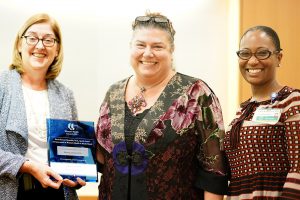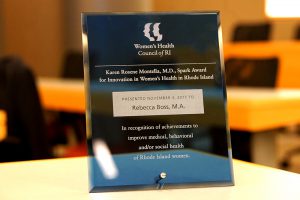Karen Rosene Montella Spark Award for Innovation in Women’s Health in RI 2016 Winner

Corinna Roy receives Spark award for recipient Rebecca Boss, Acting Director, Rhode Island Department of Behavioral Health, Developmental Disabilities and Hospitals and State Opioid Treatment Authority
For: Her development and implementation of the Anchor ED Program which connects overdose patients in Hospital EDs with peer to peer recovery support while they are being held for observation, a time when they are likely to be receptive to help from others who have lived the experience, and continues that care post visit to help them on a path to recovery and health.
Primary Evaluation Criteria:
Innovative research, education, clinical care and policy/advocacy that improves medical, behavioral and/or social health of women in Rhode Island at any point in their lifespan. Size of initiative is not relevant.
- The Program provides an innovative approach to reaching overdose patients who come to Hospital EDs and their families to improve outcomes and long-term recovery.
- The Program is reducing opioid overdose deaths, ED visits and, therefore, is impacting individuals, families and communities throughout the State as individuals begin a successful path to recovery.
 Focuses on health and/or socioeconomic disparities in community
Focuses on health and/or socioeconomic disparities in community
- The significant increase in opioid deaths in Rhode Island has become a public health crisis. Women have historically been low users of heroin but there has been a 100% increase in use among women nationwide since 2004. Rhode Island rates are rising and likely similar.
- Prior to this program patients routinely left the ED without being referred to treatment or recovery support services, a lost opportunity for intervention and successful continuity of care and a high likelihood that they would return.
Removes barriers to care or broadens reach of existing are centers
- The patients are more likely to agree to talk with an Anchor coach because of the peer to peer nature of the consult. To date, only 16 survivors have declined.
- The post ED support also enhances the chance that patients access recovery support services.
Has been in place for 1 year with demonstrable results
- Was launched in June 2014 and now a Certified Peer Recovery Specialist is available to all RI hospital EDs 24/7.
- Has successful statistics and qualitative support from ED providers and national organizations
Secondary Evaluation Criteria:
Links providers who deliver care and coordinate services or promotes the health of women
- Has developed a continuity of care from ED visit through recovery treatment and follow-up in the community.
- Uses appropriate providers at appropriate times of the patient’s visit
Expected transferability of process, service or program to other organizations
- Has already been implemented in all the EDs across the State and is being implemented in at least ten other states nationwide.
- The Director of the Office of National Drug Control Policy has called it one of the most innovative programs in the country
- The Program is supported by Certified Peer Recovery Specialists, or “Anchor coaches” who go through a vigorous training and continuing education developed for the Program.
Ability to engage patients, clients and/or community in a meaningful way
- Most of the patients seen by the Anchor coaches have not been in a formal treatment program in the prior 12 months.
- 87.5% engagement on the 30th day following an ED visit after overdosing and 37.5% have accepted a referral to detox or medicated assisted treatment within one week after the ED visit.
Other Program Components:
- Provide warm handoffs to individuals and/or family members (if the individual is agreeable) to treatment and recovery resources
- Offer SUD education and support to any family member or friend supporting the patient’s recovery
- Provide the individual and/or family member(s) (if agreeable) specific education on overdose prevention, the use of Naloxone and how to obtain Naloxone
- Review “recovery planning” tool and/or additional resources to patients and their family members
- Continued contact for additional recovery support after discharge with first contact within 24 hours
- Followed by Anchor Recovery Community Center through recovery coaching, telephone recovery support, treatment referral and recovery housing.
SUBMIT A NOMINATION
 Focuses on health and/or socioeconomic disparities in community
Focuses on health and/or socioeconomic disparities in community